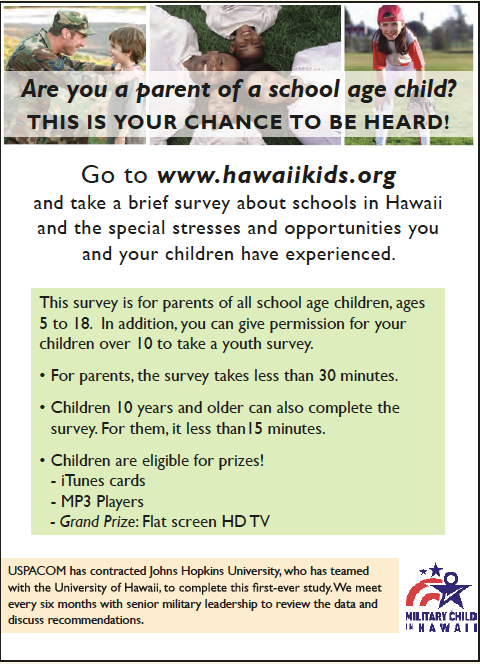 With up to 8 percent of students enrolled in Hawai‘i’s public schools coming from military families, many of them coming to Hawai‘i for a period as short as three years or less, the specific educational needs and opportunities of these students are of critical importance to the Hawai‘i Department of Education, to the Department of Defense, and to their families. In order to better understand these needs, The Longitudinal Study of Military Child Education in Hawai‘i (better known as the Military Child Education in Hawai‘i Study) was commissioned by the United States Pacific Command (USPACOM) to help provide a picture of the educational needs and opportunities facing military students and their families in Hawai‘i. The study was designed and carried out by researchers from the Johns Hopkins Bloomberg School of Public Health. These same researchers worked on a previous study of military students in Hawai‘i that CRDG conducted in 2007, and CRDG worked with Johns Hopkins on this current study facilitating the collection of data and consulting on the local education environment.
With up to 8 percent of students enrolled in Hawai‘i’s public schools coming from military families, many of them coming to Hawai‘i for a period as short as three years or less, the specific educational needs and opportunities of these students are of critical importance to the Hawai‘i Department of Education, to the Department of Defense, and to their families. In order to better understand these needs, The Longitudinal Study of Military Child Education in Hawai‘i (better known as the Military Child Education in Hawai‘i Study) was commissioned by the United States Pacific Command (USPACOM) to help provide a picture of the educational needs and opportunities facing military students and their families in Hawai‘i. The study was designed and carried out by researchers from the Johns Hopkins Bloomberg School of Public Health. These same researchers worked on a previous study of military students in Hawai‘i that CRDG conducted in 2007, and CRDG worked with Johns Hopkins on this current study facilitating the collection of data and consulting on the local education environment.
Designed to use online surveys and face-to-face focus groups, the study had the following specific objectives: 1) document youth and parental perceptions of education in Hawai‘i and possible factors contributing to those perceptions; 2) explore how attitudes, concerns, and perceptions about education (public, charter, private, and home school) in Hawai‘i change over time; 3) identify the consequences of living and being schooled in Hawai‘i after families move to a new duty station; and 4) provide policy and programmatic guidance to ensure that military families experience a positive tour of duty in Hawai‘i and that their children have optimal educational and social opportunities.
Implementation of the study began in 2010 and concluded the end of 2012. Preliminary results reported in 2012 supported the conclusion that education is one of the top concerns of military families about living in Hawai‘i. Some of the key messages that emerged from the preliminary data analyses were that transition support, academics, school quality, interpersonal relationships, and being treated fairly all matter to military parents and students, as do school safety, transition experiences, emotional supports, and perceptions of and experiences with Hawai‘i residents. Interestingly, “outside the gate” community engagement mattered a lot: positive engagement with the local community was associated with perceptions of school quality as well as with less child stress when a child’s parent was deployed.
Low participation levels by military parents and students limited the usefulness of the study, but in spite of its limitations, this study made some unique contributions that built upon previous work. It was the first study to report on the families of private school or home schooled students as well as those in public school in Hawai‘i. And it was the first study to collect social and contextual information that can now be correlated with the reports about school so as to see which of those factors are associated with perspectives and opinions about schooling. The final study results will prompt valuable recommendations for actions that can be undertaken by the military services as well as the state’s schools to ensure military children have optimal educational opportunities and experiences during their stay in Hawai‘i.